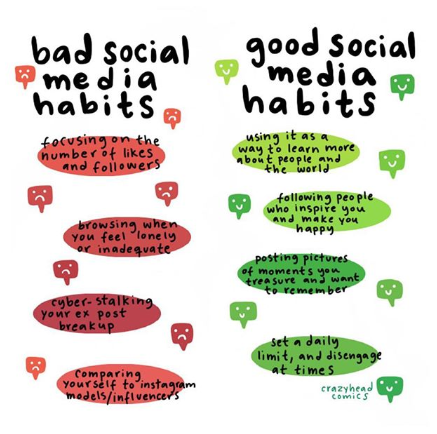When social media replaces face-to-face interactions it can have the tendency to encourage anti-social behaviour. Best and Worst Social Media Sites for Mental Health.
 Is Social Media Good Or Bad For Our Mental Health Nami National Alliance On Mental Illness
Is Social Media Good Or Bad For Our Mental Health Nami National Alliance On Mental Illness
I nstagram is the worst social media network for mental health and wellbeing according to a recent survey of almost 1500 teens and young adults.

Social media bad for mental health. A 2018 British study tied social media use to decreased disrupted and delayed sleep which is associated with depression memory loss and poor academic performance. 25 of 18 to 25-year-olds report mental illness. Encourages anti-social behaviour If not used properly social media can have hazardous consequences to our mental health.
But our reliance on social media can have a detrimental effect on our mental health with the average Brit checking their phone as much as 28 times. Too much passive use of social media just browsing posts can be unhealthy and has been linked to feelings of envy inadequa cy and less satisfaction with life. And because it represents the social world social media can also offer the opposite.
Numerous papers reviews and blogs have debated the impact of social media on our mental health and the potential uses of social media in suicide prevention and depression interventions. Because it represents the social world it can feel scary. For years people have suspected that social media use might have an ability to negatively impact our mental well-being.
For teenagers it can be self diminishing and be a component in lowering their self-esteem. Use of social media extent of usage which social media channels were favoured and their opinions on the different mediums. While it may not have the same physical health risks as substance use one of the negative effects of social media on mental health is that social media can be addictive.
These age groups report high usage of social media. Thematic analysis suggested that adolescents perceived social media as a threat to mental wellbeing and three themes were identified. Plenty of studies have found correlations between higher social media use and poorer mental health including depression anxiety feelings of.
Spending more than 3 hours on social media per day puts adolescents at a higher risk for mental health problems. While the photo-based platform got points for. Studies have even suggested that it can lead to ADHD symptoms depression anxiety and sleep deprivation.
According to a recent study social media use can increase depression and loneliness. Social media use can affect users physical health even more directly. Heres a quick run-down of the studies that have shown that social media isnt very good for mental well-being and in some ways it can be pretty damaging.
Serenity confidence and community. And the jurys still out. Importantly one recent study found that people who limited their social media use to half an hour a day have significantly lower depressive and anxiety symptoms compared to a control group.
The same 2017 RSPH report held a survey of 1500 young people and found in fact that some social media platforms are actually worse than others when it comes to the mental health and wellbeing of children. Our Mental Elf blog reviewed the use of social media and mental health. 13 of kids ages 12-17 report depression and 32 report anxiety.
Additionally students were asked to comment on the potential of social media to promote mental wellbeing and the benefits and challenges of doing so. It can spark anxiety insecurity and loneliness. Social media involves a lot of pictures and influences that can be used to compare oneself with.
1 it was believed to cause mood and anxiety disorders for some adolescents 2 it was viewed as a platform for cyberbullying and 3 the use of social media itself was often framed as a kind of addiction. It may have something to do with your social media habits. But you dont need to cut back on your social media use that drastically to improve your mental health.
When it comes to mental health perhaps social media is not such a paradox. Social Media affects mental health in many different ways. The list ranked social media sites from best to worse and included the following.
A 2018 University of Pennsylvania study found that reducing social media use to 30 minutes a day resulted in a significant reduction in levels of anxiety depression loneliness sleep problems and FOMO. Comparison is one of the main reasons for low self-esteem within the social media world.
